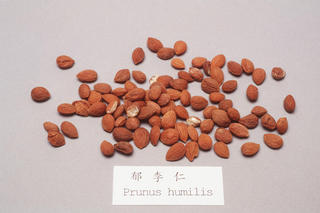Prunus pedunculata
Contents
Nomenclature
Other Names:
Historical Use of Prunus pedunculata
Prunus pedunculata in Traditional Chinese Medicine
Background
Chinese Name (pinyin): Yuliren
Chinese Name :
Common Name :Bush Cherry Seed
Specific Name : Semen pruni
Scientific Name:
Collection : The fruit is collected in summer and autumn, removed from sarcocarp and the shells. The seed is collected and dried.
Description : Xiaoliren: Ovoid, 5 - 8mm long, 3 - 5mm in diameter. Externally yellowish white or pale brown, one end acute and the other end obtuse with linear hilum on the edge of the cute end and dark colored chalaza at the center of the obtuse end from which many vascular bundle extend upwards. Testa thin, cotyledons 2, milky white, oily, slight odor and taste slightly bitter.Dalliren: 6 - 10mm long, 5 - 7 mm in diameter, externally yellowish brown.
Identification : To 0.5g of the powder in a stopper test tube, add 3ml of 5% solution of sulfuric acid, mix well, hang a strip of trinitrophenol TP in the test tube, keep the TP a distance from the solution and stopper tightly. Heat on a water bath at 40 - 50ºC for 10 minutes, the test paper turns to red color.
Processing : Eliminate foreign matter, break to pieces before use.
Action : To relax th ebowels, and to cause diuresis.
Indication : stagnancy of undigested food with abdominal distension and constipation; weakness and edema of the legs with oliguria
Precautions : Used with caution in pregnancy.
Dosage : 6 to 9 g.
Storage : Preserve in a cool and dry place, protected from moth.
Synonymns for Prunus pedunculata
Patent Medicines and Medicines with Multiple Ingredients that include Prunus pedunculata
Pharmaceutical Information
Chemical Constituents
Evidence or the Use of Prunus pedunculata in the Treatment of Epilepesy
Basic Science
Animal Studies
Cohort, Case-Control and Non-Randomized Trials
Randomized Controlled Trials
Meta-Analysis
1st Five Results: pubmed search
Ping Li, Zihan Zhao, Zongshuo Li, Rong Zeng, Weidong Li
Distinguishing features of Prunus humilis, P. japonica, P. pedunculata seeds and their adulterant based on DNA barcoding, morphological characterization, and chemical profiles.
Fitoterapia: 2024, 175;105942
[PubMed:38575088]
[WorldCat.org]
[DOI]
(I a)
Yixiao Chen, Wenquan Bao, Dun Ao, Yue Bai, Haiguang Huang, Rong Yang, Lin Wang, Ta-Na Wuyun
##Title##
Data Brief: 2024, 53;110077
[PubMed:38328281]
[WorldCat.org]
[DOI]
(I e)
Qian Liu, Zinian Wu, Chunyu Tian, Yanting Yang, Lemeng Liu, Yumei Feng, Zhiyong Li
##Title##
Front Plant Sci: 2023, 14;1266797
[PubMed:38155854]
[WorldCat.org]
[DOI]
(P e)
Tian Wan, Bai-Xue Qiao, Jing Zhou, Ke-Sen Shao, Liu-Yi Pan, Feng An, Xu-Sheng He, Tao Liu, Ping-Ke Li, Yu-Liang Cai
##Title##
Front Plant Sci: 2023, 14;1070600
[PubMed:36938043]
[WorldCat.org]
[DOI]
(P e)
Zihan Zhao, Yue Liu, Yushi Zhang, Zeyu Geng, Rina Su, Lipeng Zhou, Chao Han, Zhanjun Wang, Shuangcheng Ma, Weidong Li
Evaluation of the chemical profile from four germplasms sources of Pruni Semen using UHPLC-LTQ-Orbitrap-MS and multivariate analyses.
J Pharm Anal: 2022, 12(5);733-742
[PubMed:36320598]
[WorldCat.org]
[DOI]
(I p)
